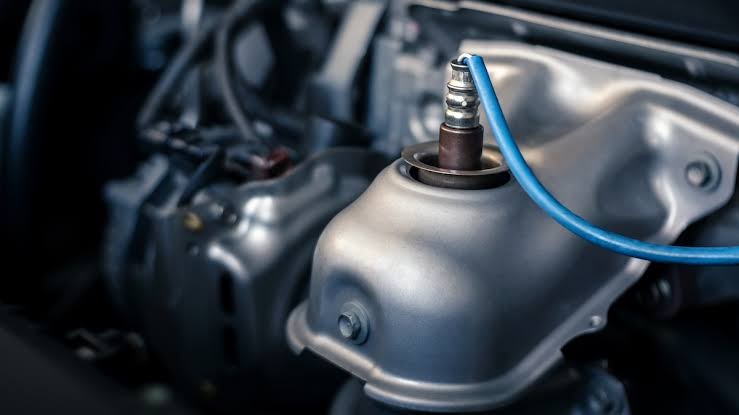P0038 is a code that tells you there is something wrong with the heater circuit of the oxygen sensor on bank 1 sensor 2. The oxygen sensor measures how much oxygen is in the exhaust gas.
The heater circuit helps the oxygen sensor warm up faster when you start the engine. This way, the oxygen sensor can give accurate readings to the PCM sooner. The PCM is the computer that controls the engine.
Bank 1 is the side of the engine where cylinder #1 is located. Sensor 2 is the oxygen sensor that is after the catalytic converter.
The PCM sets P0038 when it sees that the voltage in the heater circuit is too high. This can be caused by different things, such as:
- A bad oxygen sensor heater element
- A bad PCM
- A short circuit in the heater circuit
- A problem with the wiring harness
Related DTC codes:
- P0031, P0032, P0037: These codes are for the heater circuit of the oxygen sensor on bank 1 sensor 1 or bank 1 sensor 2.
- P0033, P0034, P0039, P0040: These codes are for the heater circuit of the oxygen sensor on bank 2 sensor 1 or bank 2 sensor 2.
Causes & Symptoms of P0038 H02S heater control circuit high (Bank 1 sensor 2)
- Bad oxygen sensor heater element: The heater element increases the resistance and voltage in the heater circuit when it is damaged or worn out. The PCM detects this as a high voltage condition and sets the code.
- Bad PCM: The PCM sends incorrect signals to the heater circuit or misinterprets the signals from the oxygen sensor when it is damaged or corroded. The PCM thinks that the voltage in the heater circuit is too high and sets the code.
- Short circuit in the heater circuit: The short circuit bypasses the resistance of the heater element and increases the current and voltage in the circuit. The PCM sees this as a high voltage condition and sets the code.
- Wiring harness problem: The wiring harness damages or disconnects the wires that connect the oxygen sensor, the heater element, and the PCM. This causes a high or low voltage condition in the heater circuit and triggers the code.
Symptoms
- Check engine light on: The PCM stores the code and turns on the light to alert you that there is a problem with your vehicle.
- Lower gas mileage: Your vehicle uses more fuel than normal when the oxygen sensor is not working properly. It cannot tell the PCM how much oxygen is in the exhaust gas. The PCM adjusts the fuel mixture based on incorrect readings and causes your vehicle to run rich or lean.
- Engine runs poorly: Your vehicle does not perform as well as it should when the oxygen sensor is not working properly. It cannot tell the PCM how much oxygen is in the exhaust gas. The PCM adjusts the timing, spark, and fuel based on incorrect readings and causes your engine to misfire, knock, or hesitate.
- Engine idles roughly: Your engine does not run smoothly at low speeds when the oxygen sensor is not working properly. It cannot tell the PCM how much oxygen is in the exhaust gas. The PCM adjusts the idle speed and fuel based on incorrect readings and causes your engine to surge, stall, or shake.
- Engine stalls: Your engine stops running unexpectedly when the oxygen sensor is not working properly. It cannot tell the PCM how much oxygen is in the exhaust gas. The PCM adjusts the fuel mixture based on incorrect readings and causes your engine to run too rich or too lean and cut off.
Troubleshooting guide:
- Look at the oxygen sensor heater element and see if it is damaged or worn out. You can use a multimeter to test the resistance of the heater element. If it is out of the specified range, you need to replace it.
- Check the voltage in the heater circuit and see if it is too high or too low. You can use a scan tool to monitor the voltage in the heater circuit. If it is out of the specified range, there might be a short circuit or an open circuit in the wiring harness.
- Look at the PCM and see if it is damaged or corroded. You can use a scan tool to check for any codes related to the PCM. If there are any, you need to replace it.
Repair:
The cost to fix P0038 depends on what is causing it. If the oxygen sensor heater element is bad, it will cost around $100-$200 to replace it. If there is a problem with the wiring harness, it could cost a lot more. You can buy the parts online or at a local auto parts store. You can also take your vehicle to a mechanic if you are not comfortable doing the repair yourself.
Conclusion:
P0038 is a code that means there is a problem with the heater circuit of the oxygen sensor on bank 1 sensor 2. This can cause your vehicle to have many issues. If you have this code, you should get your vehicle checked by a mechanic as soon as possible. You can also try to fix it yourself by following the troubleshooting guide and repair steps above.

Comments (0)
Please login to join the discussion
Be the first to comment on this article!
Share your thoughts and start the discussion